You’re reading the free version of The Morning Dispatch. Consider joining as a paid member to get full access to our news, analysis, community comments, and live events.
Happy Monday! It’s not at all unusual for Major League Baseball players to take the field for practice before each game. But typically, what they’re practicing is baseball. On Sunday, Washington Nationals relief pitcher Jose A. Ferrer broke the mold by using the opportunity to perfect his saxophone rendition of The Pink Panther theme song.
Quick Hits: Today’s Top Stories
- President Donald Trump ordered military strikes on three Iranian nuclear facilities early Sunday morning local time. The operation, during which B-2 bombers dropped more than a dozen 30,000-pound “bunker buster” bombs, caused “extremely severe damage and destruction” to the sites, Gen. Dan Caine, chairman of the Joint Chiefs of Staff, told reporters on Sunday. Trump said in an address following the attack that “our objective was the destruction of Iran’s nuclear enrichment capacity and a stop to the nuclear threat posed by the world’s number one state sponsor of terror,” adding that the operation was a “spectacular military success.” According to Axios, the U.S. informed Israeli Prime Minister Benjamin Netanyahu of its plans ahead of the operation, requesting Israeli assistance in neutralizing Iranian air defenses in the lead-up to Sunday morning. Iranian Foreign Minister Abbas Araghchi stated Sunday that Iran “reserves all options to defend its sovereignty, interest, and people,” warning of “everlasting consequences” for the U.S., while Trump cautioned that “any retaliation” by Tehran would be met with a “far worse” attack. Although both Defense Secretary Pete Hegseth and Vice President J.D. Vance said Sunday that the United States was not pushing for regime change in Iran, Trump himself seemed to warm to the idea later in the day. “It’s not politically correct to use the term, ‘Regime Change,’” he wrote on Truth Social. “But if the current Iranian Regime is unable to MAKE IRAN GREAT AGAIN, why wouldn’t there be a Regime change??? MIGA!!!”
- Hours after the American operation on Sunday morning, Iran launched ballistic missiles at civilian centers across Israel, destroying apartment buildings in three Israeli cities, including a nursing home in Tel Aviv, and injuring 86 people. Meanwhile, Israeli airstrikes killed three Iranian commanders on Saturday, Israeli Defense Minister Israel Katz said, including Mohammed Said Izadi, who led the Palestinian affairs branch in Iran’s Quds Force and was reportedly involved in the planning of Hamas’ October 7 attacks on Israel. According to Katz, Izadi “funded and armed Hamas ahead of the October 7 massacre” at the terrorist group’s request.
- The Israel Defense Forces (IDF) announced Sunday that its forces recovered the bodies of three hostages—one soldier and two civilians—who were murdered by Hamas terrorists on October 7, 2023, and abducted into Gaza. Using “precise intelligence,” the IDF said it retrieved the bodies in Gaza through a joint operation between the military and Shin Bet, Israel’s domestic security agency. Israeli officials identified the deceased hostages as 19-year-old Staff Sgt. Shay Levinson, who was killed while stationed at the Gaza border; 22-year-old Yonatan Samerano, who was killed at the Nova music festival; and 71-year-old Ofra Keidar, who was killed while taking a morning walk.
- Belarusian President Alexander Lukashenko freed opposition leader Sergei Tikhanovsky, who was arrested in May 2020 after announcing a campaign for president, and 13 other prisoners on Saturday. Their release came hours after Belarus’ authoritarian leader met with Trump’s envoy for Ukraine, retired Lt. Gen. Keith Kellogg, in Minsk. Upon his release, Tikhanovsky was sent to Lithuania, where he reunited with his wife, Svetlana Tikhanovskaya, a prominent Belarusian opposition leader in exile. During a press conference on Sunday, Tikhanovsky called on the government to free the more than 1,000 political prisoners still behind bars in Belarus.
- Asked Friday about new Russian military offensives against Ukraine, Russian President Vladimir Putin claimed that Russians and Ukrainians were one people, saying, “in that sense, the whole of Ukraine is ours and that “wherever a Russian soldier steps foot, that’s ours.” In response, Ukrainian Foreign Minister Andrii Sybiha said Putin’s comment exemplified Russia’s “disdain” for U.S.-led peace efforts. Meanwhile, on Sunday, Ukraine’s top military commander, Oleksandr Syrskyi, said that Ukrainian forces continue to control about 35 square miles of territory in Russia’s Kursk region and are currently fending off 10,000 Russian troops in the area.
- Federal District Judge John McConnell Jr. on Thursday temporarily blocked the Transportation Department from withholding transportation-related funding from states that do not comply with the Trump administration’s immigration enforcement efforts. In his order, McConnell ruled that a lawsuit—led by Democratic attorneys general from 20 states—was likely to win the broader merits of the case, because Congress, in appropriating state transportation funding, did not outline any conditions related to federal immigration laws. Transportation Secretary Sean Duffy said he would challenge the ruling, which he called “judicial activism pure & simple.”
- Federal District Judge Allison Burroughs issued a preliminary injunction on Friday blocking the Department of Homeland Security from revoking Harvard’s ability to enroll international students while permitting the administration to issue Harvard “routine requests for information and documents” to ensure the university is in compliance with federal regulations. Burroughs had previously issued a temporary restraining order preventing the DHS from pulling Harvard’s Student and Exchange Visitor Program certification, which DHS Secretary Kristi Noem threatened to do if the university did not comply with the administration’s requests, which included information about Harvard’s students and their potential criminal records. Earlier on Friday, Trump said it’s “very possible” a deal with Harvard will be announced in the next week, adding the university has “acted extremely appropriately during these negotiations.”
- Mahmoud Khalil—a legal permanent U.S. resident and anti-Israel activist whom immigration agents arrested in March—was released on bail Saturday, one day after a court order mandating his release. While the Trump administration argued in court documents that Khalil’s actions risked compromising a “compelling U.S. foreign policy interest,” Federal District Judge Michael Farbiarz ruled that Khalil was not a threat. Farbiarz added that Khalil could potentially be deported over allegations that he lied when applying for a green card—which Khalil denies—but that he must be released on bail while those proceedings unfold.
- A church security guard in Wayne, Michigan, shot and killed a gunman on Sunday who opened fire in the church, injuring one person in the leg. Moments before the security guard fatally shot the assailant, a different individual struck the shooter with his vehicle. The pastor of the church said it was hosting its Vacation Bible School, and that many children were inside at the time of the shooting. Police are investigating the attack and have not yet publicly identified the gunman’s motive.
Make Iran Great Again?
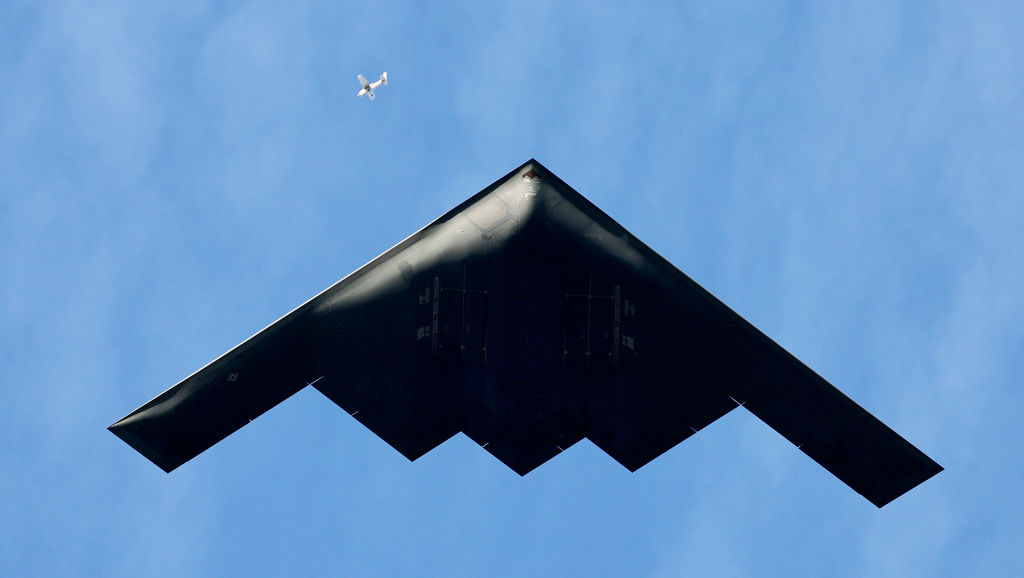
Early Sunday morning local time, the U.S. joined Israel’s bombing campaign against Iran, striking three nuclear sites in a bid to dash the Islamic Republic’s atomic ambitions once and for all. The operation—involving more than 125 aircraft, including seven B-2 stealth bombers armed with 30,000-pound “bunker buster” bombs—targeted Natanz, Isfahan, and Fordow in what President Donald Trump described as a “spectacular military success.”
“Iran’s key nuclear enrichment facilities have been completely and totally obliterated. Iran, the bully of the Middle East, must now make peace. If they do not, future attacks will be far greater—and a lot easier,” Trump said in brief remarks following the strikes, flanked by Vice President J.D. Vance, Secretary of State Marco Rubio, and Defense Secretary Pete Hegseth. “There will either be peace or there will be tragedy for Iran, far greater than we have witnessed over the last eight days.”
In the attack’s immediate aftermath, U.S. officials emphasized that it was a one-off operation aimed at eliminating the imminent threat of a nuclear-armed Iran and urged the Islamic Republic not to respond. But whether Tehran shares Washington’s desire to de-escalate remains to be seen. While the Trump administration pushes for the battered regime to agree to a deal, Iran’s leaders may choose to double down rather than acquiesce to American demands.
This weekend’s strikes followed a week of uncertainty in the Middle East, with allies and adversaries alike trying to predict the United States’ next move amid a widening military confrontation between Israel and Iran. While Trump spoke openly about pursuing diplomacy with the Iranian government, U.S. Central Command head Gen. Michael “Erik” Kurilla readied American forces for an ambitious and highly classified bombing campaign. Key to the operation’s success was deception: Ahead of the strikes, the U.S. military moved B-2 bombers west, to Guam, as a fleet of seven B-2s quietly made their way eastward.
The mission—dubbed Operation Midnight Hammer—required multiple in-flight refuelings and hundreds of planes, including fighter jets, refueling tankers, and reconnaissance aircraft. It also utilized an offshore submarine, which fired more than two dozen Tomahawk missiles against above-ground targets at the nuclear site in Isfahan. But the most important job was left to the B-2s. In addition to striking Natanz, the stealth bombers dropped GBU-57 “Massive Ordnance Penetrators” on Fordow, an Iranian uranium enrichment plant built into the side of a mountain. The aerial attack marked the largest operational strike using B-2s to date and the second-longest B-2 mission ever flown.
Gen. Dan Caine, chairman of the Joint Chiefs of Staff, told reporters Sunday that the U.S. pilots made it into and out of Iran without coming under fire from either enemy fighters or anti-aircraft systems. And initial assessments indicated that all three sites sustained “extremely severe damage and destruction,” he added. According to Fox News, the precision strike on Fordow targeted ventilation shafts, allowing the munitions to penetrate more deeply. But it will likely take time before the full extent of the damage is understood. “It would be way too early for me to comment on what may or may not still be there,” Caine said when asked if some nuclear capability in Iran remains.
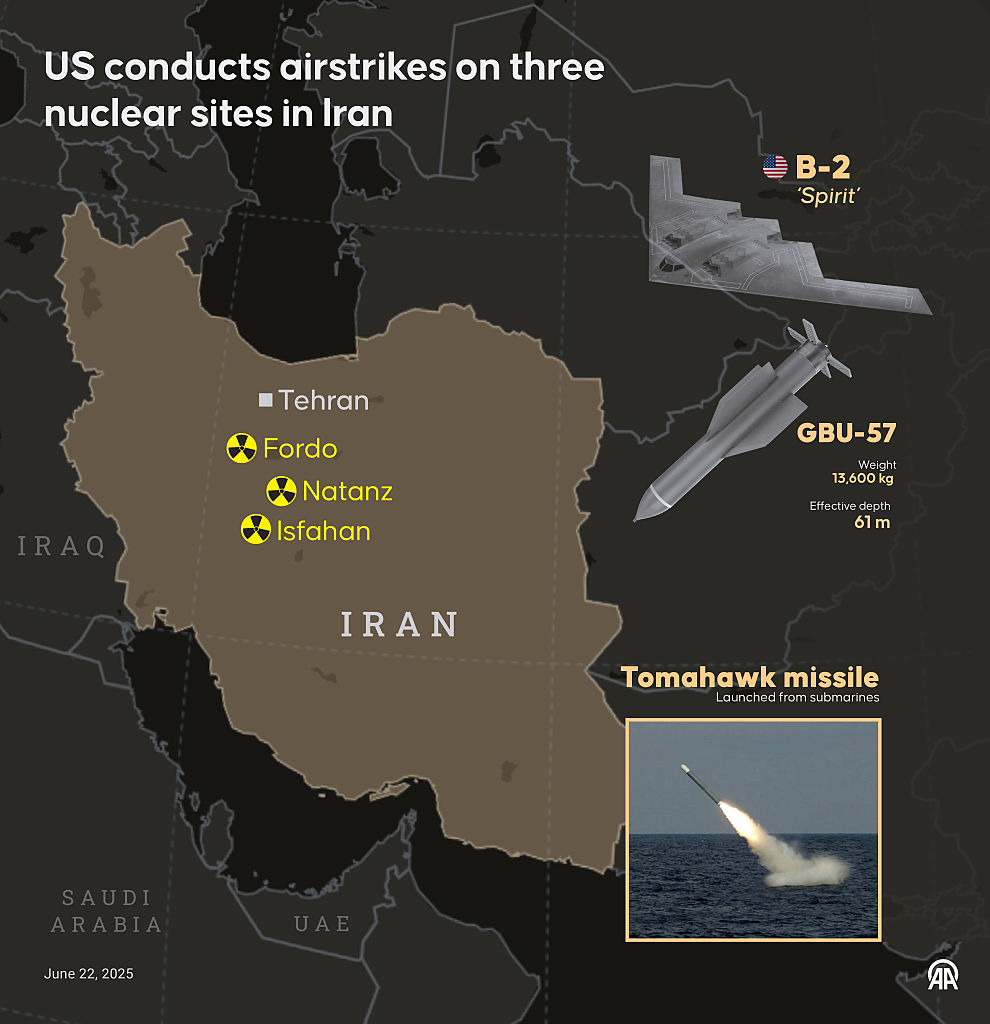
Unlike Israel’s ongoing campaign in Iran, the American operation targeted the Islamic Republic’s nuclear program alone. “President Trump has consistently stated, for over 10 years, that Iran must not get a nuclear weapon—full stop,” Hegseth said from the Pentagon on Sunday. “We devastated the Iranian nuclear program. But it’s worth noting, the operation did not target Iranian troops or the Iranian people.” Asked by a reporter whether Washington was seeking regime change in Iran, Hegseth stressed the narrow scope of the mission: “This mission was not and has not been about regime change.”
But Trump muddied the waters in a Truth Social post hours later. “It’s not politically correct to use the term, ‘Regime Change,’” he wrote, “but if the current Iranian Regime is unable to MAKE IRAN GREAT AGAIN, why wouldn’t there be a Regime change??? MIGA!!!”
The operation was met with mixed reactions on Capitol Hill, with many of the president’s allies applauding his boldness while Democrats—and some Republicans—expressed concerns about the legal authorization for the strikes. “Donald Trump’s decision to launch direct military action against Iran without congressional approval is a clear violation of the Constitution, which grants the power to declare war explicitly to Congress,” Rep. Jim Himes, the top Democrat on the House Intelligence Committee, said in a statement. “It is impossible to know at this stage whether this operation accomplished its objectives. We also don’t know if this will lead to further escalation in the region and attacks against our forces, events that could easily pull us even deeper into a war in the Middle East.”
Whether the U.S. widens its war aims will likely be determined by the Iranian response. While American officials have urged Tehran not to retaliate for the initial strikes, the Islamic Republic may be gearing up for an escalation. Iran’s parliament voted on Sunday to close the Strait of Hormuz, a vital chokepoint for the world’s oil and gas supply—though there are currently no indications that Iran has followed through on the threat—and U.S. military bases and embassies across the Middle East are bracing for the possibility of attacks from either Iran or its network of regional proxies. And far from its own borders, Iranian officials have reportedly threatened to activate sleeper cells to carry out terrorist plots within the United States.
But Trump has vowed to respond overwhelmingly in the event of an Iranian attack, and with the taboo of directly striking the Islamic Republic now broken, Tehran is likely inclined to believe him. “After this attack, they know that the president’s willing to hit Iran,” Elliott Abrams, a senior fellow for Middle East studies at the Council on Foreign Relations and former national security official in several Republican presidential administrations, told TMD. “And if they kill Americans, he will hit them very, very hard.”
Iran can also continue to direct attacks at Israel. Hours after the U.S. operation on Sunday, the country launched more than 40 ballistic missiles at urban centers across Israel, damaging several buildings—including a nursing home—and wounding 86 people. And Jerusalem’s strikes on Iran show no signs of slowing, particularly with America’s vocal support. During his address after the U.S. strikes, Trump thanked Prime Minister Benjamin Netanyahu by name: “We worked as a team like perhaps no team has ever worked before, and we’ve gone a long way to erasing this horrible threat to Israel.”
But that threat might not be totally eradicated. While the U.S. mission targeted enrichment sites, senior U.S. officials have since acknowledged that they don’t know what became of the enriched uranium itself. Still, they argue, the immediate threat of a nuclear-armed Iran has been significantly degraded following the destruction of other components necessary to make a bomb. And Israeli intelligence would likely pick up on any Iranian efforts to use that fuel to move toward weaponization.
During a press conference on Sunday, Netanyahu alluded to insight into the possible whereabouts of Iran’s 400-kilogram stockpile of enriched uranium. “We’ve been following that very closely,” he told reporters. “It’s an important component of a nuclear program. It’s not the sole component, it’s not a sufficient component, but it is an important component. And we have interesting intel on that, which you’ll excuse me if I don’t share with you.”
The American attack also sent a clear message to Iran that strikes are on the table if it doesn’t voluntarily abandon what remains of its nuclear program. The Islamic Republic now finds itself in an impossible situation: Succumbing to U.S. demands would project weakness to its people, but continuing to fight a losing battle risks further undermining regime stability. “Trump wanted to engage in coercive diplomacy to force the Islamic Republic to make a choice: It could preserve its regime or have a nuclear program. It can’t have both,” Jason Brodsky, the policy director at United Against Nuclear Iran, told TMD. “The Islamic Republic, however, decided to risk a military strike rather than agree to the president’s terms, and so now it’s in a deeper hole than it was 24 hours ago.”
And abandoning the country’s nuclear program now would be an admission by Tehran that enduring decades of crippling sanctions served no purpose beyond impoverishing and isolating the Iranian people. “The prestige of the regime has really been damaged a lot,” Abrams said. “If you’re an Iranian citizen, what have these people done for you? They’ve been there 46 years, and if you compare their neighbors—the Emirates, for example, or Saudi Arabia—you have governments that are trying to develop the economy and change the country.”
Brodsky concurred. “This regime is a threat not only to the region and to the United States, but also to the Iranian people,” he said. “But it’s going to be up to the Iranian people to decide their own future. With the regime weakened, that does open up potential opportunities, but it’s not going to happen overnight.”
“We’re buying time here,” he added. “There are no happy endings with the Islamic Republic.”
Today’s Must-Read
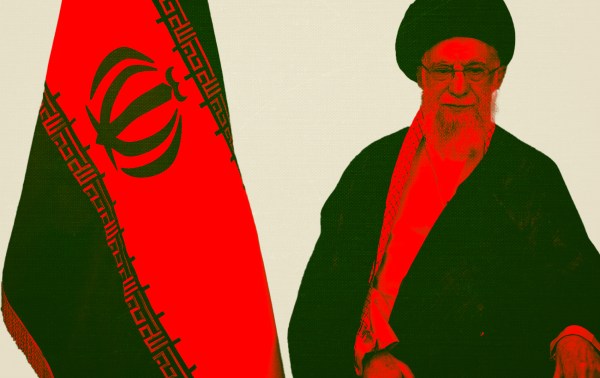
How Will Iran Respond?
Toeing the Company Line

A Virtue-Centric Argument for Political Liberalism



The Right Call at the Right Time

NYC Dems Poised to Pick Between ‘Drastic’ and Familiar

Homeschooling Against the Machine


Worth Your Time
- As Trump hints at the possibility of regime change in Iran, the question naturally arises: How would the Islamic Republic fall? “There are many paths to regime change in Iran,” Eric Edelman, Reuel Marc Gerecht, and Ray Takeyh wrote in Foreign Affairs late last week. “In all cases of regime change, the indispensable preconditions for success are that the government becomes weaker and the populace becomes bolder. … In the past week, Israel has done a significant amount to establish the first condition. It has not just disabled key Iranian nuclear facilities but also essentially decapitated Iran’s military leadership.” Still, they explained, “Israel will have to do a lot more to shatter the coercive powers of the theocracy’s police state—and do so without military actions that kill large numbers of civilians, especially women and children.” Even then, regime change does not happen overnight: “Once Iran is disarmed, Israel and the United States might be tempted to walk away and look elsewhere. It is precisely at that moment that it should instead increase pressure on the regime.”
- Free markets: What are they good for? Writing in Project Syndicate, Michael Strain argued that they’re more than a mere tool. “In a recent interview with The New York Times … [Vice President J.D.] Vance made clear his belief that ‘the market economy is the best way of provisioning goods and services and coordinating people across a very complex society,’ but the market, in his view, is a ‘tool,’ rather than ‘the purpose of American politics.’ Is he right? Is the market merely a tool—a means to an end? Or should a free and well-functioning market be an end in itself? These seemingly esoteric questions underpin many policy disagreements in the United States,” Strain wrote. “Market-oriented policymakers and commentators are reflexively concerned about laws or regulations that might impede economic efficiency, whereas the progressive left and the right-wing ‘Make America Great Again’ movement lack that impulse—and, like Vance, are often dismissive of it. But advancing market efficiency should be a goal of government. Vance is right that markets are the best way to allocate scarce resources and coordinate economic behavior. Because their smooth functioning generates greater prosperity, making markets free and efficient is, in fact, to use Vance’s language, a ‘purpose of American politics.’”
Presented Without Comment
New York Times: Sheltering In A Bunker, Iran’s Supreme Leader Prepares For The Worst
Wary of assassination, Iran’s supreme leader mostly speaks with his commanders through a trusted aide now, suspending electronic communications to make it harder to find him, three Iranian officials familiar with his emergency war plans say.
Ensconced in a bunker, the supreme leader, Ayatollah Ali Khamenei, has picked an array of replacements down his chain of military command in case more of his valued lieutenants are killed.
And in a remarkable move, the officials add, Ayatollah Khamenei has even named three senior clerics as candidates to succeed him should he be killed, as well—perhaps the most telling illustration of the precarious moment he and his three-decade rule are facing.
Also Presented Without Comment
Axios: LA Dodgers To Donate $1m To Help Immigrants Hit By ICE Raids
In the Zeitgeist
Movie and television writers have long relied on cloning technology—the science of using DNA samples to reproduce genetic copies—to further the plot of their scripts, as in classics such as Jurassic Park, Star Wars, and Futurama.
Unfortunately, advertisers seem to have taken note. Liquid Death is now selling empty iced tea cans, drank—and autographed—by Ozzy Osbourne, containing “trace amounts” of the heavy metal rock star’s DNA and marketed as a “can of infinitely recyclable Ozzy.”
Let Us Know
Do you agree with Trump’s decision to order a strike on Iran’s nuclear sites?




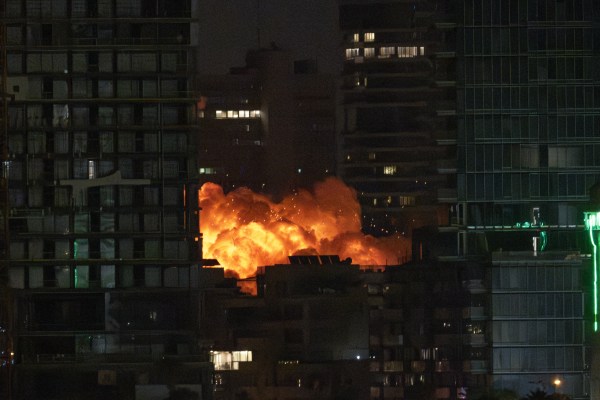


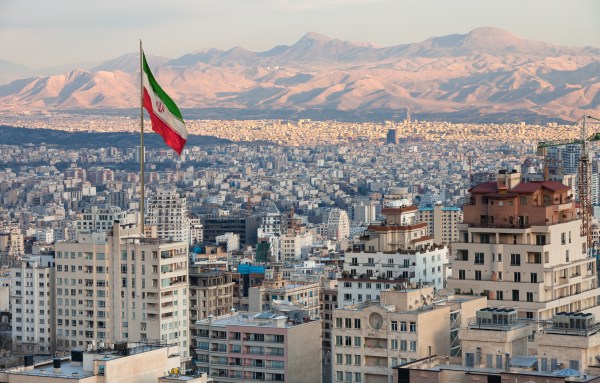


Please note that we at The Dispatch hold ourselves, our work, and our commenters to a higher standard than other places on the internet. We welcome comments that foster genuine debate or discussion—including comments critical of us or our work—but responses that include ad hominem attacks on fellow Dispatch members or are intended to stoke fear and anger may be moderated.
With your membership, you only have the ability to comment on The Morning Dispatch articles. Consider upgrading to join the conversation everywhere.